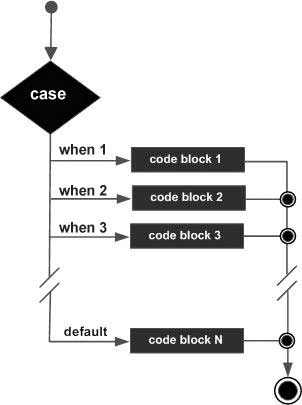
- PL/SQL - Home
- PL/SQL - Overview
- PL/SQL - Environment
- PL/SQL - Basic Syntax
- PL/SQL - Data Types
- PL/SQL - Variables
- PL/SQL - Constants and Literals
- PL/SQL - Operators
- PL/SQL - Conditions
- PL/SQL - Loops
- PL/SQL - Strings
- PL/SQL - Arrays
- PL/SQL - Procedures
- PL/SQL - Functions
- PL/SQL - Cursors
- PL/SQL - Records
- PL/SQL - Exceptions
- PL/SQL - Triggers
- PL/SQL - Packages
- PL/SQL - Collections
- PL/SQL - Transactions
- PL/SQL - Date & Time
- PL/SQL - DBMS Output
- PL/SQL - Object Oriented
PL/SQL - Searched CASE Statement
The searched CASE statement has no selector and the WHEN clauses of the statement contain search conditions that give Boolean values.
Syntax
The syntax for the searched case statement in PL/SQL is −
CASE WHEN selector = 'value1' THEN S1; WHEN selector = 'value2' THEN S2; WHEN selector = 'value3' THEN S3; ... ELSE Sn; -- default case END CASE;
Flow Diagram

Example
DECLARE
grade char(1) := 'B';
BEGIN
case
when grade = 'A' then dbms_output.put_line('Excellent');
when grade = 'B' then dbms_output.put_line('Very good');
when grade = 'C' then dbms_output.put_line('Well done');
when grade = 'D' then dbms_output.put_line('You passed');
when grade = 'F' then dbms_output.put_line('Better try again');
else dbms_output.put_line('No such grade');
end case;
END;
/
When the above code is executed at the SQL prompt, it produces the following result −
Very good PL/SQL procedure successfully completed.
plsql_conditional_control.htm
Advertisements